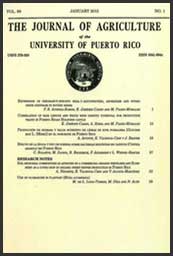Resumen
La mayoría de los estudios ecológicos en áreas tropicales se centran en organismos que participan en redes tróficas de pastoreo, mientras que pocos se han enfocado en la diversidad de invertebrados en el suelo, hojarasca o madera muerta que participan de redes tróficas de detrito. En los bosques tropicales, el estado de información sobre la diversidad de animales del suelo es limitado, especialmente cuando se compara con otros ecosistemas tales como bosques templados, praderas y desiertos. Dada la alta tasa de conversión forestal y la persistencia de la deforestación en los trópicos, es importante estudiar la diversidad de su fauna y evaluar cómo los cambios globales afectarán los vínculos entre la biota del suelo y el funcionamiento del ecosistema. Este artículo de revisión se centra en censos de biodiversidad y estudios realizados en Puerto Rico, una isla tropical caribeña donde un número significativo de investigaciones ecológicas se han centrado en la caracterización de la fauna edáfica y cómo influyen en los procesos de los ecosistemas en áreas boscosas. Los resultados de las experimentaciones sugieren que la fauna del suelo es un determinante importante de la descomposición y del ciclo de nutrientes en estos bosques. Asimismo, este artículo resalta la importancia de las limitaciones metodológicas en estudios que comparan estos organismos en sitios con diferentes condiciones climáticas, y se centra en la descripción de estudios ecológicos relacionados con los efectos de los microartrópodos sobre la hojarasca y la descomposición de la madera.Descargas
Los datos de descargas todavía no están disponibles.

